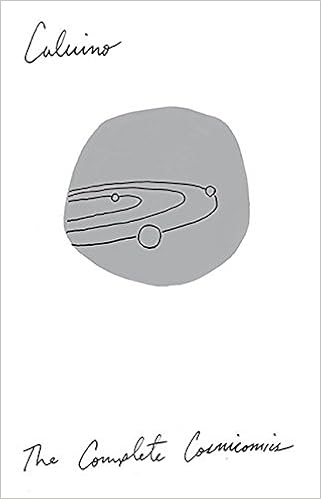'Playing? With what?'
'With a thing,' he said.
You understand? It was the first time. There had never been things to play with before. And how could we have played? With that pap of gaseous matter? Some fun: that sort of stuff was all right perhaps for my sister G'd(w)n. If Rwzfs was playing, it meant he had found something new; in fact, afterwards, exaggerating as usual, they said he had found a pebble. It wasn't a pebble, but it was surely a collection of more solid matter or--let's say--something less gaseous. He was never very clear on this point; that is, he told stories, as they occurred to him, and when the period came when nickel was formed and nobody talked of anything but nickel, he said: "That's it: it was nickel. I was playing with some nickel!"
Each of Italo Calvino's Cosmicomics begins with an assertion about the earth or the universe before the advent of human beings: once, the moon was much closer to the earth, or, the more distant a galaxy is from us, the farther away it moves. Then the voice of the narrator, an immortal named Qwfwq, chimes in to tell us exactly what it was like in those days. Sure, he says, the moon was much closer; we used to row our boats out to it and jump on to harvest moon milk. The stories are both fanciful and charming, melding speculative science with a casual and playful voice. Qwfwq has been a single-celled organism, a mollusk, a dinosaur, a camel. Qwfwq's immortality is not explained; the cosmicomics aren't those kinds of stories. In mode they hew closer to the tall tales of the American frontier than hard science fiction, like the unbelievable tales of Paul Bunyan or Pecos Bill.
The subtle brilliance of the Cosmicomics, collected here in total, is that they encourage us to enlarge our view of the universe in its entirety, temporally as well as spatially. It's all well and good to be told that everything that exists used to be crammed into a single infinitesimal point, but it's quite another to imagine what that was actually like, when everyone's all ass-to-elbows on top of each other like a crowed tenement building. Of course, it wasn't like that at all; there is no way to describe what it would be like to be alive before the Big Bang because the circumstances would permit neither human existence nor sensory experience, but that's not the point. The point is that the very thought that you could imagine it is breathtakingly bold.
But the Cosmicomics rely also on a canny set of observations about contemporary human nature. One of the best stories, "The Aquatic Uncle," provides a sketch of a fish who refuses to adapt once everyone else in his family has grown legs and started living on the land:
This business about warts was a widespread prejudice among the old fish: a notion that, from living on dry land, we would develop warts all over our bodies, exuding liquid matter: this was true enough for the toads, but we had nothing in common with them; on the contrary, our skin, smooth and slippery, was such as no fish had ever had; and our great-uncle knew this perfectly well, but he still couldn't stop larding his talk with all the slanders and intolerance he had grown up in the midst of.
Qwfwq's great-uncle is an image of every uncle whose prejudices are indulged at the Thanksgiving table; no one wants to upset him too much by insisting that his worldview is antiquated. But it also extends a great sympathy toward the uncle, whose world has changed very rapidly, and presents an understanding of how and why particular atavisms can be so beguiling (Qwfwq's land-raised fiancee ends up running off with his aquatic uncle). In "All at One Point," the universe begins to expand because a single beloved woman laments that she does not have enough space to "make tagliatelle for all you boys," and the very conception of such generosity pushes the limits of the known universe. These are finely drawn portraits of human nature, even as they find their setting in places and times that no human ever was.
The Cosmicomics were a life's work for Calvino, and they are perhaps not best read all in a row--they too can get to feeling like a universe's worth of knowledge pressed into a single point. Later logic experiments with probability and time get very tedious, borrowing from Borges with less purpose and clarity. But when Qwfwq's voice is strongest--casual, insightful, funny, but a little smug--the stories are really inspired.


No comments:
Post a Comment